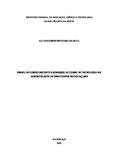Perfil do corpo discente e egressos do curso de tecnologia em agroecologia do IFRN Campus Ipanguaçu/RN

Visualizar/
Data
2022-10-24Autor
Silva, Allan Kedson Frutuoso da
http://lattes.cnpq.br/0681629307653642
Metadado
Mostrar registro completoResumo
The green revolution had a great impact due to the modernization of agricultural implements and intensive management for large-scale food production, among other factors. The consequences of this process include the indiscriminate use of pesticides, rural exodus, and territorial advance by large industries and exclusion of family farmers. In this same scenario, the need arises to oppose this current model of food production and rural property management, thus starting a cycle of debates that culminated in technical and higher agroecology courses spread across the country. Among these spaces, we had the implementation of the Agroecology Course at the IFRN Campus Ipanguaçu/RN, an occupied territory by indigenous people, quilombo community, campers, settlers, family farmers and agribusiness entrepreneurs. This work proposed to carry out a data collection regarding the classes enrolled between the years 2012 to 2016 of the higher course Technology in Agroecology, offered by the Federal Institute of Education, Science and Technology of Rio Grande do Norte - Campus Ipanguaçu, emphasizing the path of student training. For this, official data from the Academic Secretariat of the Campus were collected and the graduating students were contacted through digital means, carrying out a questionnaire through the Google Forms tool. 26 questionnaires were applied among the 52 graduates trained. The questionnaire was applied between 06/28/2021 and 01/06/2022. This is a qualitative, exploratory and descriptive research. The data obtained from the Academic Secretariat show that the female group is more participatory in the Technology in Agroecology course. Enrollment, dropout and course completion rates by the female group are higher when compared to the male group. Considering the possibilities of the job market for graduates, the IFRN/IP has been taking initiatives, such as the Agricultural Professional Residency Program (PRPA), to support them, as well as direct current students of the course to gain paid practical experience in their field of training. It is worth mentioning that the “evasion” phenomenon is not a regional or local particularity, and is present throughout the national territory. However, its motivation may be due to several factors.



